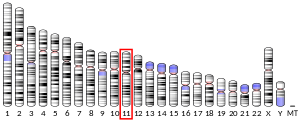From Wikipedia, the free encyclopedia
Protein-coding gene in the species Homo sapiens
Olfactory receptor 5P3 is a protein that in humans is encoded by the OR5P3 gene .[ 5]
Olfactory receptors interact with odorant molecules in the nose, to initiate a neuronal response that triggers the perception of a smell. The olfactory receptor proteins are members of a large family of G-protein-coupled receptors (GPCR) arising from single coding-exon genes. Olfactory receptors share a 7-transmembrane domain structure with many neurotransmitter and hormone receptors and are responsible for the recognition and G protein-mediated transduction of odorant signals. The olfactory receptor gene family is the largest in the genome. The nomenclature assigned to the olfactory receptor genes and proteins for this organism is independent of other organisms.[ 5]
The OR5P3 receptor is associated with examples of ligands includes:[ 6] [ 7]
1-octanol
celery ketone
(-)-carvone
^ a b c ENSG00000280808, ENSG00000278253 GRCh38: Ensembl release 89: ENSG00000182334, ENSG00000280808, ENSG00000278253 – Ensembl , May 2017^ a b c GRCm38: Ensembl release 89: ENSMUSG00000063764 – Ensembl , May 2017^ "Human PubMed Reference:" . National Center for Biotechnology Information, U.S. National Library of Medicine .^ "Mouse PubMed Reference:" . National Center for Biotechnology Information, U.S. National Library of Medicine .^ a b "Entrez Gene: OR5P3 olfactory receptor, family 5, subfamily P, member 3" .^ Audouze K, Tromelin A, Le Bon AM, Belloir C, Petersen RK, Kristiansen K, et al. (2014). "Identification of odorant-receptor interactions by global mapping of the human odorome" . PLOS ONE . 9 (4): e93037. Bibcode :2014PLoSO...993037A . doi :10.1371/journal.pone.0093037 PMC 3973694 PMID 24695519 . ^ Sanz G, Thomas-Danguin T, Hamdani EH, Le Poupon C, Briand L, Pernollet JC, et al. (September 2008). "Relationships between molecular structure and perceived odor quality of ligands for a human olfactory receptor" . Chemical Senses . 33 (7): 639– 53. doi :10.1093/chemse/bjn032 PMID 18603653 .
Gaudin JC, Breuils L, Haertlé T (November 2001). "New GPCRs from a human lingual cDNA library" . Chemical Senses . 26 (9): 1157– 66. doi :10.1093/chemse/26.9.1157 PMID 11705801 . Fuchs T, Malecova B, Linhart C, Sharan R, Khen M, Herwig R, et al. (September 2002). "DEFOG: a practical scheme for deciphering families of genes". Genomics . 80 (3): 295– 302. doi :10.1006/geno.2002.6830 . PMID 12213199 . Malnic B, Godfrey PA, Buck LB (February 2004). "The human olfactory receptor gene family" . Proceedings of the National Academy of Sciences of the United States of America . 101 (8): 2584– 9. Bibcode :2004PNAS..101.2584M . doi :10.1073/pnas.0307882100 PMC 356993 PMID 14983052 .
This article incorporates text from the United States National Library of Medicine , which is in the public domain .
Class I
Family 51 Family 52 Family 56
Class IItetrapod specific receptors)
Family 1 Family 2 Family 3 Family 4 Family 5 Family 6 Family 7 Family 8 Family 9 Family 10 Family 11 Family 12 Family 13





